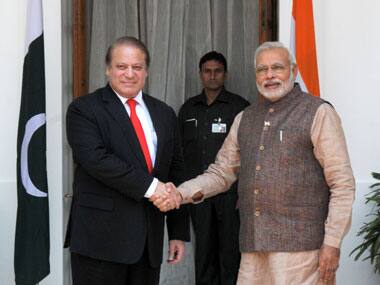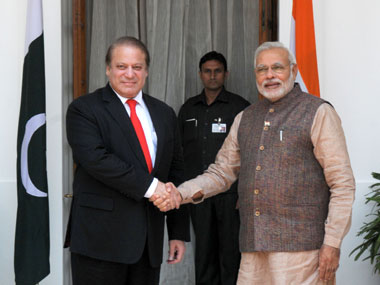It is not surprising that the Narendra Modi government has unilaterally cancelled the 25 August foreign secretary level talks with Pakistan. Not doing so would have been surprising after what has happened today in New Delhi and in the past ten days along the International Border and the Line of Control. Here is a quick 360 degree analysis of the latest development in India-Pakistan bilateral relations. The timing The Modi government waited for the first set of meeting of Pakistan High Commissioner in New Delhi Abdul Basit with Kashmiri separatists to take place. The Indian government did not block it as it is this meeting which has given it the ammunition to fire the first salvo at Pakistan. Foreign secretary telephoned Basit today and told him tersely: “Either talk to separatists or talk to us.” Though the second set of meetings between the Pakistani envoy and leaders of the Hurriyat Conference is scheduled for Tuesday, the Modi government will most likely block it, showing the separatists and Pakistan its fist of fury. [caption id=“attachment_1669609” align=“alignleft” width=“380”]  The bonhomie ends. Image courtesy PIB[/caption] What it means for Pakistan? This is bad news for Pakistan, particularly for the beleaguered premier Nawaz Sharif. The Sharif government has scored a self-goal by its ill-conceived move of encouraging its New Delhi envoy to invite the Kashmiri separatists for ‘consultations’. How would Pakistan feel if the Indian envoy in Islamabad invites Baloch separatists or other disgruntled groups in Pakistan for ‘consultations’? In fact, this may well be one of the options before Modi government in its diplomatic toolkit to use with Pakistan in future. Pakistan’s civil as well as military leadership needed tranquility on their India front in view of the myriads of problems – Pakistan’s unfolding Arab Spring and threats from homegrown terror outfits. But the conduct of Islamabad and Rawalpindi has been just the opposite. Now Pakistan will inevitably face heat on its India border and the Indian armed forces, with their tail up, will be bad for Pakistan. What it means for India? The Modi government too has not emerged unscathed in this episode. The Modi government too has inflicted a self-goal. PM Modi’s statesman-like initiative of inviting Nawaz Sharif for his swearing in ceremony on 26 May has now fizzled out. It shows Modi in bad light and no wonder that the Congress has jumped in the fray with a lightning speed pooh-poohing Modi government’s “knee-jerk diplomacy” and questioning whether the Indian government has any Pakistan policy in the first place. Consider the following on-record remark of Congress leader Manish Tiwari for further perspective: “Why did Narendra Modi rush into inviting Sharif to India for his swearing-in even before the formation of his government? This is a classic example of knee-jerk diplomacy that you rush in even before the government is formed to invite the PM of Pakistan, not withstanding provocation, cross-border intrusion, attack on our consulate in Afghanistan which was traced back to the ISI, the deletion of Hafiz Saeed’s name from the chargesheet of 26/11. Now when there has been a public outcry including against the meeting of Pakistan High Commissioner with the separatist leaders, you in a knee-jerk manner go ahead and cancel it. Does this government have a Pakistan policy?” What it means for India-Pakistan bilateral relations? India-Pakistan bilateral ties are now back to square one. It will have a long-term impact. Modi may not meet his Pakistani counterpart in New York next month. Even if the meeting takes place, it will now hardly be a structured, substantive meeting. Even worse, the Indian armed forces would now inevitably be under instructions to give a bloody nose to Pakistani troops whenever they open unprovoked firing on the borders next time. If this happens, this is bound to escalate tensions, which in turn, would mean return of international pressure on India. In a nutshell, Modi’s honeymoon with Pakistan is over. He was romancing the stones, after all! For the record sake, this is how the official spokesperson responded to India calling off the foreign secretary-level talks with Pakistan: At a time when serious initiatives were being undertaken by the Government of India to move bilateral ties forward, including towards the resumption of a regular dialogue process, the invitation to so-called leaders of the Hurriyat by Pakistan’s High Commissioner does indeed raise questions about Pakistan’s sincerity, and shows that its negative approaches and attempts to interfere in India’s internal affairs continue unabated. Indian foreign secretary conveyed to the Pakistan High Commissioner today, in clear and unambiguous terms, that Pakistan’s continued efforts to interfere in India’s internal affairs were unacceptable. It was underlined that the Pakistani High Commissioner’s meetings with these so called leaders of the Hurriyat undermines the constructive diplomatic engagement initiated by Prime Minister Modi in May on his very first day in office. The only path available to Pakistan is to resolve outstanding issues through a peaceful bilateral dialogue within the framework and principles of the Simla Agreement and the Lahore Declaration. Therefore, under the present circumstances, it is felt that no useful purpose will be served by the Indian Foreign Secretary going to Islamabad next week. Foreign secretary’s visit to Islamabad for talks on 25 August stands cancelled. The writer is Firstpost consulting editor and a strategic analyst who tweets @Kishkindha.
PM Modi’s statesman-like initiative of inviting Nawaz Sharif for his swearing in ceremony on 26 May has now fizzled out.
Advertisement
End of Article
Written by Rajeev Sharma
Consulting Editor, Firstpost. Strategic analyst. Political commentator. Twitter handle @Kishkindha. see more


)

)
)
)
)
)
)
)
)



